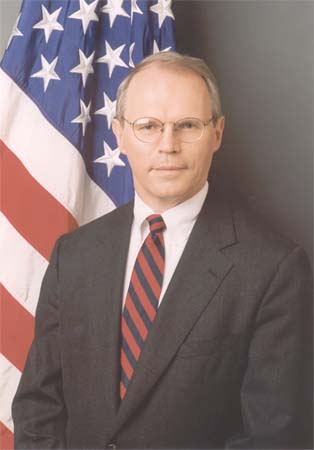
"North Korea has difficulty saying things publicly," Hill said. Indeed, the still-secret text of the new agreement has elements similar to the Shanghai Communique issued by China and United States in 1972 during President Richard Nixon's historic visit, in which the two sides offered their own interpretations of key disputes. Hill said that resolving questions about Pyongyang's interest in uranium enrichment remain important, but that plutonium poses an immediate proliferation risk. "We are trying to focus on the plutonium as we try to resolve our suspicions on uranium enrichment," Hill said. Recalling Willie Sutton's line that he robbed banks because "that's where the money is," Hill said: "That's where the bombs are. We don't have suspicions about plutonium; we have cold, hard facts about plutonium." Christopher R. Hill, assistant secretary of state for East Asian and Pacific Affairs and former U.S. ambassador to South Korea, served as a Peace Corps Volunteer in Cameroon.
U.S. officials have concluded it is more important to persuade North Korea to surrender its weapons-grade plutonium -- enough for perhaps half a dozen weapons -- than for the process to collapse over the impasse, according to Assistant Secretary of State Christopher R. Hill, the chief U.S. negotiator
U.S. Ready to Ease Sanctions on N. Korea
Pyongyang Would Have to Acknowledge Evidence About Nuclear Activities
By Glenn Kessler
Washington Post Staff Writer
Friday, April 11, 2008; Page A15
The United States is prepared to lift two key economic sanctions against North Korea under a tentative deal reached with that country this week, which requires Pyongyang to acknowledge U.S. concerns and evidence about a range of nuclear activities, U.S. and Asian diplomats said yesterday.
The agreement also requires North Korea to finish disabling its main nuclear facility and provide a full accounting of its stockpile of plutonium. But, in a key shift, the two sides agreed to sidestep a dispute over how much detail North Korea must provide about any past uranium enrichment-related activities and its involvement in a mysterious Syrian facility bombed by Israel last September.
North Korea had balked at confirming the Bush administration's allegations, stalling for months a process designed to eliminate its nuclear programs. But after negotiations this week in Singapore and last month in Geneva, the United States and North Korea agreed that Pyongyang must "acknowledge" the allegations without precisely admitting them publicly.
That paves the way, diplomats said, for President Bush to remove North Korea from the U.S. list of state sponsors of terrorism and to exempt it from the Trading With the Enemy Act.
U.S. officials have concluded it is more important to persuade North Korea to surrender its weapons-grade plutonium -- enough for perhaps half a dozen weapons -- than for the process to collapse over the impasse, according to Assistant Secretary of State Christopher R. Hill, the chief U.S. negotiator.
"North Korea has difficulty saying things publicly," Hill said. Indeed, the still-secret text of the new agreement has elements similar to the Shanghai Communique issued by China and United States in 1972 during President Richard Nixon's historic visit, in which the two sides offered their own interpretations of key disputes.
Hill said that resolving questions about Pyongyang's interest in uranium enrichment remain important, but that plutonium poses an immediate proliferation risk.
"We are trying to focus on the plutonium as we try to resolve our suspicions on uranium enrichment," Hill said. Recalling Willie Sutton's line that he robbed banks because "that's where the money is," Hill said: "That's where the bombs are. We don't have suspicions about plutonium; we have cold, hard facts about plutonium."
North Korea acquired much of its plutonium after the 2002 collapse of a Clinton administration agreement barring operation of a plutonium-producing reactor. Bush accused North Korea of cheating on the deal, citing evidence that Pyongyang had a clandestine uranium-enrichment program. Plutonium and highly enriched uranium offer different routes to building nuclear weapons.
Some North Korea experts are skeptical Pyongyang will ever give up its recently acquired plutonium.
Diplomats say Japan is upset that North Korea may be removed from the terrorism list before questions are resolved about North Korea's abductions of Japanese citizens. In its 2004 report, the State Department said that the kidnapping issue was a factor in North Korea's inclusion on the list, but in recent months the administration has steadily unlinked the two issues.
North Korea is one of five countries on the list of state sponsors of terrorism, which makes it subject to severe U.S. export controls, particularly of dual-use technology and military equipment. Those controls prohibit much foreign aid and obligate the United States to oppose financial assistance to the country from institutions such as the World Bank and the International Monetary Fund.
Under the agreement, Pyongyang would also be freed from financial sanctions imposed by the Trading With the Enemy Act, a 1917 law that allows for a near-total economic boycott of countries at war with the United States.
Hill previously has said U.S. officials concluded that thousands of aluminum tubes acquired by North Korea in 2002 -- which prompted the intelligence finding that Pyongyang was building a large-scale uranium-enrichment program -- were not currently being used to create fissile material.
North Korea allowed U.S. diplomats to visit a missile factory that used the tubes and to carry samples home, but government scientists later discovered traces of enriched uranium on the aluminum samples, officials said.
U.S. officials said further negotiations are needed, and an Asian diplomat said those will involve the amount of plutonium that North Korea plans to declare. Last year, North Korea said that it possessed about 30 kilograms of plutonium, much less than U.S. intelligence had estimated.
"The ball is on the North Korean side," the diplomat said, speaking on the condition of anonymity. "We need to have a clear explanation for the amount, and it has to be verified."
The United States is preparing about 500,000 tons of food aid to assist North Korea with a devastating grain crisis, but Hill said that is unrelated to the nuclear discussions.








